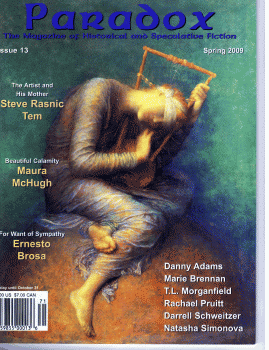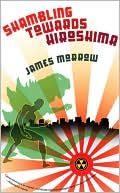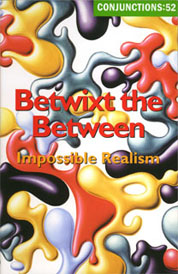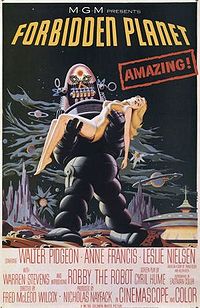Short Fiction Review #18: Paradox-Final Issue
 It’s nothing new to hear that yet another print publication has gone the way of the dinosaurs. Still, for those of us who retain affection for inked dead trees, it’s always a cheerless day to learn of yet another comet strike.
It’s nothing new to hear that yet another print publication has gone the way of the dinosaurs. Still, for those of us who retain affection for inked dead trees, it’s always a cheerless day to learn of yet another comet strike.
The latest victim is Paradox, Editor/Publisher Christopher Cevasco’s biannual magazine of historical speculative fiction, which is now, well, history. After thirteen issues (read into the significance of the number what you will), Cevasco has retired the magazine effective with the Spring 2009 edition. Although he hints that an on-line version may arise from the ashes at some point, or that there may be a future Paradox-themed anthology, it would appear this is not going to be a Lance Armstrong/Bret Favre kind of retirement – Cevasco seems pretty adamant that this is it for the magazine.

 One good thing about the recession is I have more time to catch up on my reading. And I don’t have to worry about spending money on books during tough times as I already own a ridiculous number of volumes that I never had the time to get around to. One of almost recent vintage is Shambling Towards Hiroshima by James Morrow. It’s a clever premise: a parallel effort to the Manhattan Project is to develop a race of super lizards to level Japanese cities and end World War II. The irony here is that the whole Godzilla mythos of badly made, badly acted 1950s Japanese movies was a metaphorical projection of the atomc bombings. The plot, such as it is , concerns an American horror monster actor who is recruited to provide a realistic demonstration of the lizard’s destructiveness to force the Japanese surrender without having to deploy the monsters (what many critics of the U.S. atomic bombings argue might have sufficed instead of targeting cities). Morrow is one of my favorite authors, though this is a minor work; even at novella length, the premise is stretched a bit thin, and maybe would have worked better at a shorter length in pruning some plotting that doesn’t really advance the theme. Still, worth checking out.
One good thing about the recession is I have more time to catch up on my reading. And I don’t have to worry about spending money on books during tough times as I already own a ridiculous number of volumes that I never had the time to get around to. One of almost recent vintage is Shambling Towards Hiroshima by James Morrow. It’s a clever premise: a parallel effort to the Manhattan Project is to develop a race of super lizards to level Japanese cities and end World War II. The irony here is that the whole Godzilla mythos of badly made, badly acted 1950s Japanese movies was a metaphorical projection of the atomc bombings. The plot, such as it is , concerns an American horror monster actor who is recruited to provide a realistic demonstration of the lizard’s destructiveness to force the Japanese surrender without having to deploy the monsters (what many critics of the U.S. atomic bombings argue might have sufficed instead of targeting cities). Morrow is one of my favorite authors, though this is a minor work; even at novella length, the premise is stretched a bit thin, and maybe would have worked better at a shorter length in pruning some plotting that doesn’t really advance the theme. Still, worth checking out.
 The spring issue of Conjunctions, the literary magazine of Bard College, is called “Between and Betwixt: Impossible Realism,” described as “postfantasy fictions that begin with the premise that the unfamiliar or liminal really constitutes a solid ground on which to walk.” This is a follow-up to its “New Wave Fabulist” issue back in 2003, which I reviewed for
The spring issue of Conjunctions, the literary magazine of Bard College, is called “Between and Betwixt: Impossible Realism,” described as “postfantasy fictions that begin with the premise that the unfamiliar or liminal really constitutes a solid ground on which to walk.” This is a follow-up to its “New Wave Fabulist” issue back in 2003, which I reviewed for  I’m looking forward to China Miéville’s new novel, The City and the City. In the meantime, here’s an
I’m looking forward to China Miéville’s new novel, The City and the City. In the meantime, here’s an  Given all the discussion of late about reboots, I wonder why no one has ever thought to revisit this classic. Forbidden Planet was my Star Wars when I was in fifth grade. In the New York metro area, Channel 9 had a feature called “Million Dollar Movie” that used to play a particular movie ever day throughout the week in the early evening. Forbidden Planet was a regular staple, and whenever it was in rotation, I was there in front of the TV (which, to give you an idea of how old I am, displayed only black and white).
Given all the discussion of late about reboots, I wonder why no one has ever thought to revisit this classic. Forbidden Planet was my Star Wars when I was in fifth grade. In the New York metro area, Channel 9 had a feature called “Million Dollar Movie” that used to play a particular movie ever day throughout the week in the early evening. Forbidden Planet was a regular staple, and whenever it was in rotation, I was there in front of the TV (which, to give you an idea of how old I am, displayed only black and white). The notion of the female warrior, while rooted somewhat in factual history (e.g., Joan of Arc), is largely an idealized notion of mythology, science fiction and fantasy. I suppose there is doctoral dissertation potential in figuring out why patriarchal societies that at best otherwise relegate women to supportive roles away from the battlefield (and at worst and more typically brutally victimize women as spoils of war) generate these tales of powerful females who can lop off a head or two as well as the next guy. Speaking as a guy whose adolescent sexual fantasies were heavily influenced by Emma Peel, the black leather-clad consort of John Steed in saving the free world from various madmen bent on world domination by delivering a quick blow to the groin, I’m guessing it’s some kind of inversion of castration anxiety.
The notion of the female warrior, while rooted somewhat in factual history (e.g., Joan of Arc), is largely an idealized notion of mythology, science fiction and fantasy. I suppose there is doctoral dissertation potential in figuring out why patriarchal societies that at best otherwise relegate women to supportive roles away from the battlefield (and at worst and more typically brutally victimize women as spoils of war) generate these tales of powerful females who can lop off a head or two as well as the next guy. Speaking as a guy whose adolescent sexual fantasies were heavily influenced by Emma Peel, the black leather-clad consort of John Steed in saving the free world from various madmen bent on world domination by delivering a quick blow to the groin, I’m guessing it’s some kind of inversion of castration anxiety.